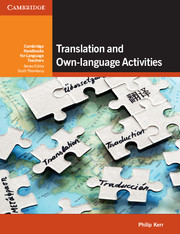Book contents
Summary
What kind of tools are there?
Digital technology has brought a huge proliferation of language learning tools. Traditional print media continue to diversify (e.g. dictionaries, magazines, graded or parallel readers), with increasing bilingual options. But almost all of the printed content is also available in other formats, for delivery to laptops, smartphones, interactive whiteboards, or learning platforms. These media also benefit from being online, where they can connect with other services, such as instant machine translation. All of the activities in this chapter encourage learners to explore the options that are available to them.
Digital literacies
Students are sometimes better informed than teachers about the tools available to them, but they do not always know how to make the best, or most critical, use of them. Our students may know their way around the Web, but they are not necessarily digitally literate. Digital literacy is being promoted by many governments around the world and is a central part of the curriculum in many educational contexts. Language teachers cannot really afford to be digitally illiterate themselves.
Many language learners will turn, outside the classroom, to digital aids and resources, even if only to do their homework more accurately or quickly. Many will be using online dictionaries, online translation tools, streamed movies and video clips with subtitles, and various apps on their smartphones. Some will be using these resources in an attempt to cheat. Learners will clearly benefit from guidance in their choice of tools, and guidance in how to use them. It may not be apparent to some that the openly-editable nature of online encyclopaedias (such as Wikipedia) means that their accuracy is not guaranteed and that an online translation tool – any online translation tool – may not be the most accurate way to translate a text.
Monolingual, bilingual or bilingualised?
Many of the learning aids available to learners and teachers come in both monolingual and bilingual versions: dictionaries, videos, websites, games, grammar guides and coursebooks often exist in two versions. For any given group of learners, which of these will be more appropriate?
Conventional teacher wisdom has tended to prefer monolingual tools. For a long time, monolingual learner's dictionaries were promoted over small bilingual dictionaries, despite the fact that most learners have repeatedly shown a preference for the latter. Research that supports the teacher's preference is, however, limited.
- Type
- Chapter
- Information
- Translation and Own-language Activities , pp. 47 - 74Publisher: Cambridge University PressPrint publication year: 2014



